Picture yourself in a calm church with a gentle candlelit glow. You breathe in the scented air, feeling the quiet respect around you. Everyone gathers as the pastor lifts a piece of bread. You can’t help but feel excited. This moment steeped in tradition connects you to Christians from long ago.
Communion goes beyond a simple act. It’s a journey of the spirit. Passed on through ages, it unites those who believe, no matter when or where. When we share bread and a cup, something sacred happens. It’s a connection with something greater than ourselves.
But what’s the true meaning behind communion? Why is it a big deal for our spiritual well-being? And how does it bring people in the church together? This article will tackle these questions. We’ll look at communion’s deep meaning, its roots in the Bible, and what it teaches us.
Key Takeaways:
- Communion is a sacred Christian tradition with deep spiritual significance.
- It fosters unity within the church and connects believers across time and space.
- Communion represents a moment of divine connection and serves as a symbol of faith and love.
- Participating in communion can lead to personal and spiritual growth.
- Understanding the meaning of communion can deepen our relationship with God and nurture a sense of reverence.
Biblical Definition of Communion
In the Bible, communion is also called the Eucharist and the Lord’s Supper. It’s a special Christian practice full of meaning. It marks Jesus Christ’s sacrifice on the cross with a symbolic meal.
The Significance of Communion
Communion shows how Christians come together spiritually and stay strong in their faith. Like a meal brings people together, communion unites them in Jesus’s love. Through it, they remember his sacrifice for their sins.
“Take, eat; this is my body. Drink from it, all of you. This is my blood of the covenant, which is poured out for many for the forgiveness of sins.”
Jesus said these words during the Last Supper, making communion important in Christianity. By sharing bread and wine, Christians recall Jesus’s sacrifice and how his blood forgives their sins.
It also joins hearts and minds of Christian followers. Sharing this meal, they show they’re one in their faith. They remember Jesus’s teachings and recommit to follow them together.
By taking part in communion, Christians don’t just recall Jesus’s act but also deepen their bond with God. It’s a moment of looking within, asking for forgiveness, and renewing their faith.
Biblical References to Communion
The Bible talks a lot about communion. In 1 Corinthians 11:23-26, Paul tells how to do it, focusing on remembering Jesus.
For I received from the Lord what I also passed on to you: The Lord Jesus, on the night he was betrayed, took bread, and when he had given thanks, he broke it and said, “This is my body, which is for you; do this in remembrance of me.” In the same way, after supper he took the cup, saying, “This cup is the new covenant in my blood; do this, whenever you drink it, in remembrance of me.” For whenever you eat this bread and drink this cup, you proclaim the Lord’s death until he comes.
Luke 22:19-20 and Matthew 26:26-28 also tell us how Jesus started communion during that Last Supper. They show how important the bread and wine are, symbolizing his body and blood.
Communion is a cherished Christian practice found all through the Bible. It helps believers feel Jesus’s self-sacrificial love. It brings them together and helps in their spiritual journey.
Relevant Bible Verses about Communion
Many Bible verses teach us about communion’s meaning. They show us it’s about remembering Jesus’ love. And why we should take it with care and thanks. Here are some verses:
1 Corinthians 11:23-26
“When Jesus was betrayed, he took bread. After giving thanks, he broke it. He said, ‘This is my body given for you, remember me with this.’ After that, he took a cup, ‘In my blood is the new deal with God. Drink this whenever you remember me.’ Each time you eat this bread and drink this cup, you remember Jesus until he comes again.” (1 Corinthians 11:23-26, NIV)
This passage tells us about the Last Supper. Paul shares what Jesus said and did. It shows that when we have communion, we remember Jesus’ great love. This is shown through bread and a cup.
Luke 22:19-20
“Jesus gave thanks, broke the bread, and gave it. He said, ‘This is my body given for you; remember me when you eat it.’ Then he took the cup after supper. He said, ‘This cup shows the new deal with God. It’s my blood poured out for you.'” (Luke 22:19-20, NIV)
In Luke’s telling of the Last Supper, Jesus talks about his sacrifice. He tells us to use communion to remember his love shown by his body and blood. This shows communion is about remembering Jesus’ huge sacrifice.
Matthew 26:26-28
“During the meal, Jesus took the bread. He thanked God, broke it, and gave it to his followers. He said, ‘Take and eat; this is my body.’ Next, he took a cup, thanked God, and gave it to them. He said, ‘All of you drink from it. This is my blood. It makes the deal with God, a deal that pays for many people’s sins.'” (Matthew 26:26-28, NIV)
Matthew’s story of the Last Supper reminds us of Jesus’ words. It tells us the bread and cup stand for Jesus’ body and blood. The passage connects communion to Jesus’ way of saving us from sin.
The Bible verses explain why communion is important. They say it’s a way we show love to Jesus and each other. We remember his sacrifice and feel spiritually full. Let’s think deeply and be thankful when we take communion. 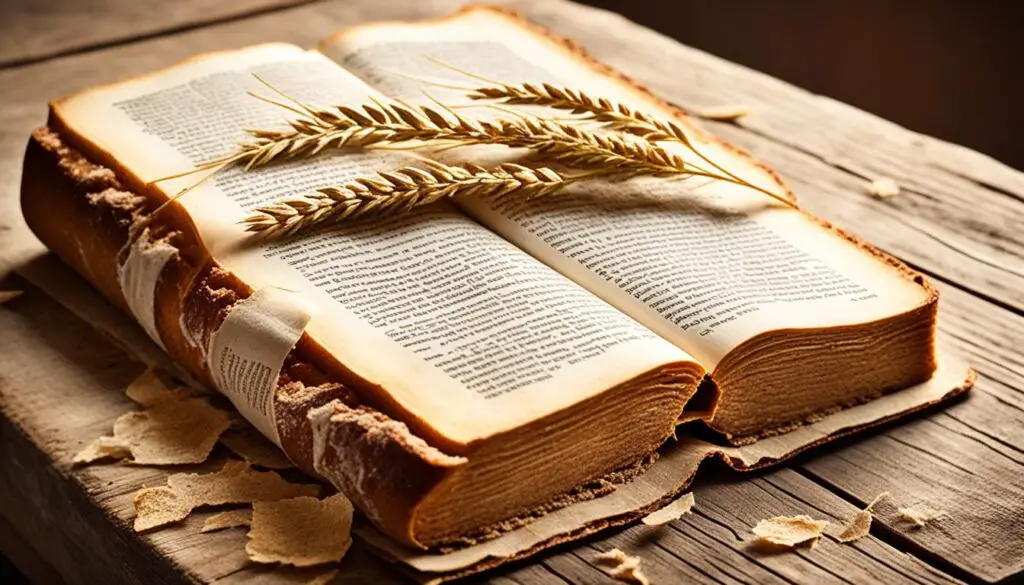
Examples of Communion in the Bible
The Bible shows us many times when early Christians shared communion. These stories remind us how important communion is for Christians.
Acts 2:42 – Devotion to the Breaking of Bread
“They devoted themselves to the apostles’ teaching and to fellowship, to the breaking of bread and to prayer.”
In Acts 2:42, early believers dedicated themselves to breaking bread. This likely means they were doing communion. It shows how gathering, eating together, and remembering Jesus was central to them.
The Last Supper – Jesus Institutes Communion
“While they were eating, Jesus took bread, and when he had given thanks, he broke it and gave it to his disciples, saying, ‘Take it; this is my body.’ Then he took a cup, and when he had given thanks, he gave it to them, and they all drank from it. ‘This is my blood of the covenant, which is poured out for many.'”
At the Last Supper, Jesus broke bread and shared wine with his followers. He said the bread was his body and the wine his blood. This started the tradition of communion in the Christian faith.
The stories show us how important communion is. They remind us to remember Jesus’ sacrifice for us. They also show how communion brings faith communities together.
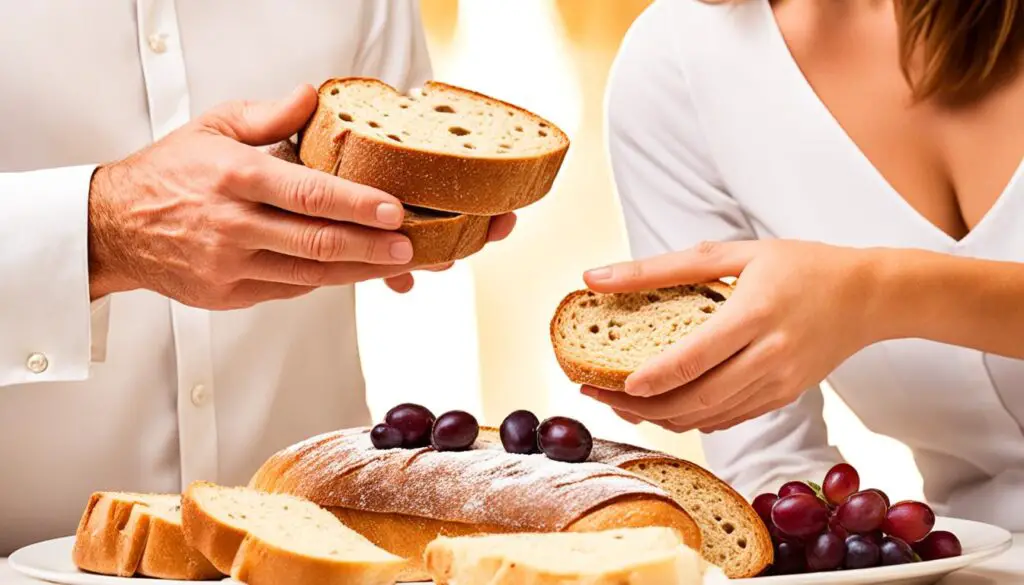
| Example | Scripture Reference |
|---|---|
| Acts 2:42 | They devoted themselves to the breaking of bread |
| The Last Supper | Jesus institutes communion with his disciples |
Lessons from Communion
Communion is both a special Christian tradition and a spiritual practice. It teaches believers important lessons. By partaking, we remember God’s great love and Jesus’ sacrifice for us.
One lesson is about being thankful. As we take the bread and wine, we think about the big gifts of grace and mercy. This makes us feel humble and thankful for everything God gives us.
Also, communion shows we should be humble. We see our need for God and realize we can’t do everything by ourselves. Taking part in Christ’s body and blood reminds us to be humble. It also tells us to love and support others with kindness.
Through communion, we connect with Christ and each other. It builds unity and a shared goal among believers.

Implications of Communion in Personal Life
Participating in communion deeply affects personal life and spiritual practice. It lets an individual grow closer to God. It’s a time to ask for forgiveness, gain spiritual strength, and show deep respect and faith.
The Deepening of the Relationship with God
Communion helps believers connect with God more. They remember Jesus’ love and sacrifice. This memory strengthens their bond with God, making their faith more personal.
Seeking Forgiveness and Renewal
It’s a moment to think about mistakes and ask for forgiveness. Believers find peace in God’s mercy. Communion helps them leave their past errors behind and feel hopeful again.
Spiritual Nourishment and Strength
Partaking in bread and wine during communion is like feeding the soul. It offers spiritual strength. It’s a reminder of how Jesus’ sacrifice fuels the faith journey.
Communion helps people respect God more in their personal life. It’s about connecting deeply with God, seeking forgiveness, and gaining spiritual strength on their journey.
Communion has always been a special, sacred moment for Christians. It lets them think about Jesus’ love and grace. By taking part, believers meet God, find forgiveness, and strengthen their faith.

| Implications of Communion in Personal Life | Benefits |
|---|---|
| Deepening of the Relationship with God | – Closer bond with the Creator – Intimate and personal relationship |
| Seeking Forgiveness and Renewal | – Reflection and repentance – Letting go of past mistakes – Embracing hope and transformation |
| Spiritual Nourishment and Strength | – Refreshing and strengthening faith – Symbolic nourishment of the soul – Life-giving power of Jesus’ sacrifice |
Implications of Communion for Society
Communion isn’t just about personal faith. It affects society in big ways. It helps people unite at church. It also makes them show love, grace, and forgiveness to everyone. This makes communities stronger and leads to more kindness and helpfulness.
When people come together for communion, they remember what they believe. They find common ground and make closer relationships. This makes their church stronger and more united.
At communion, they think about Jesus’s love. So, they also want to love and forgive others. This is a key lesson from communion.
“For if you forgive other people when they sin against you, your heavenly Father will also forgive you.” – Matthew 6:14
Believers use communion as a guide to help others. They care for the needs of fellow believers and people who aren’t part of their faith. This shows the kind of love Jesus taught.
By living out communion’s lessons, believers change society. They work for fairness and kindness. They make their communities better for everyone.
Examples of Communion’s Impact:
- Communities coming together to provide food, shelter, and support for those in need
- Churches collaborating with other organizations to address societal issues such as poverty, inequality, and injustice
- Believers actively participating in volunteer work and community outreach programs
Communion inspires people to act with love and kindness. It helps in making the world a better place.
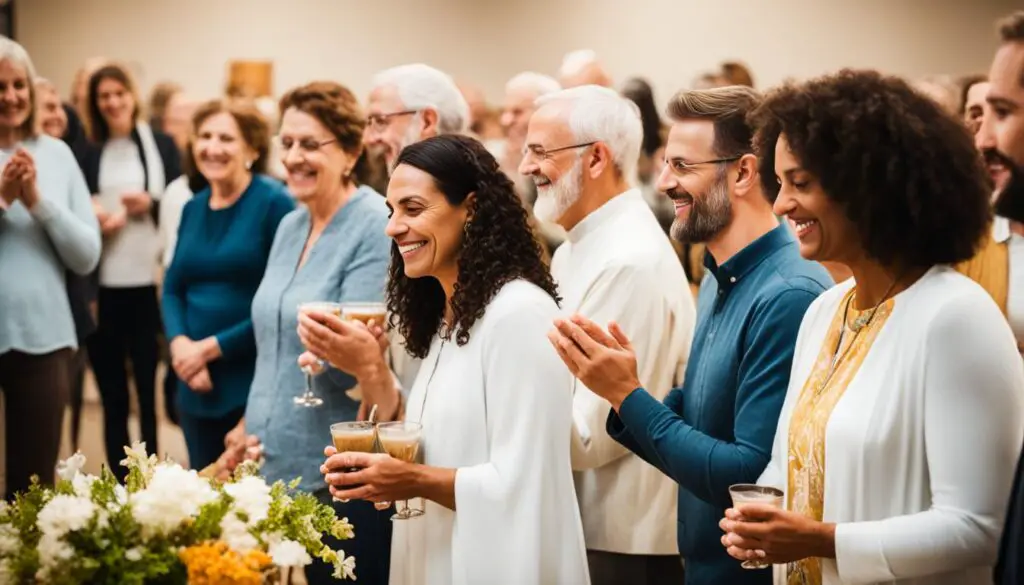
| Implications of Communion for Society | |
|---|---|
| Promotes church unity | Encourages believers to extend love, grace, and forgiveness to others |
| Fosters a sense of community | Encourages acts of service and compassion |
| Strengthens the bonds of fellowship | Challenges believers to imitate Jesus’ sacrificial love |
| Brings people together across barriers | Inspires believers to advocate for justice and equality |
Communion in Different Church Traditions
Various church traditions celebrate communion differently. Each focuses on different parts of this sacred sacrament. Beliefs, rituals, and scripture understanding all play a part.
Common Cup, Intinction, and Individual Cups
Some churches share from a common cup to show Christ’s body’s unity. They believe in a communal bond through drinking from one cup.
Others dip the bread in wine, symbolizing Christ’s sacrifice’s unity. This act is full of meaning, representing spiritual unity.
Now, many churches use individual cups for hygiene. They still honor the sacrament’s importance but make it safe for everyone.
The Doctrine of Transubstantiation and the Sacred Nature of the Elements
The Roman Catholic Church teaches transubstantiation. They believe the bread and wine truly become Jesus’ body and blood. This underscores the elements’ deep sacredness.
Orthodox Church teaches that the elements carry God’s grace. They see the bread and wine as more than symbols, but as a spiritual connection to God.
Diverse Practices in Protestant Churches
Protestant churches have varying communion practices. Some use wine and communal cups for unity and signifying Christ’s sacrifice. Others use grape juice and individual cups to be practical and welcoming.
Some Protestant churches have “open communion.” They welcome all Christian believers, whatever their church’s name. This shows unity and inclusivity in faith.
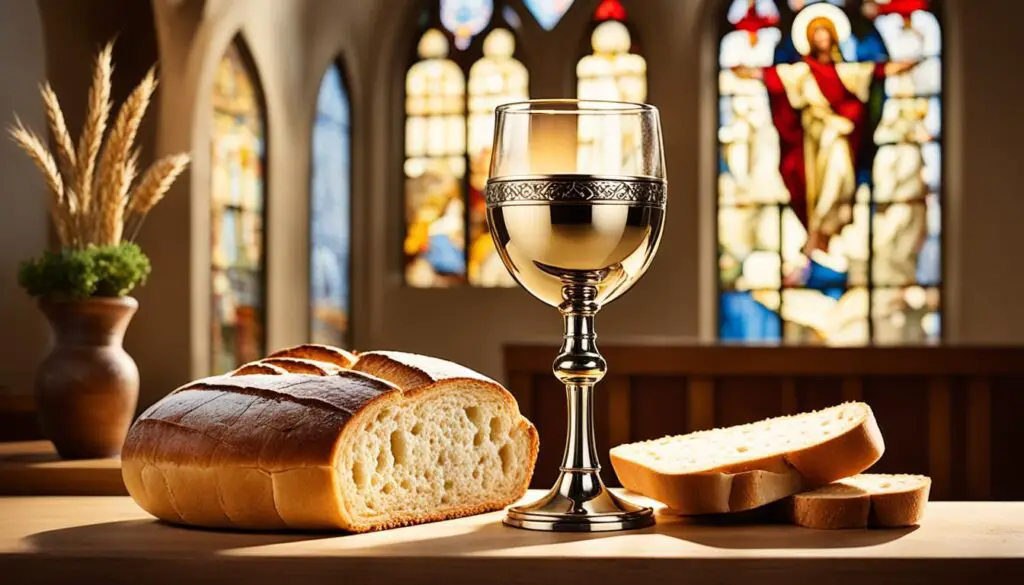
Communion is central in Christianity, connecting believers to Christ’s sacrifice. Each tradition brings unique practices to this important act, enriching believers’ spiritual paths.
Communion Requirements in the Roman Catholic Church
In the Roman Catholic Church, communion is a big deal. It’s not for everyone. You must follow some rules to join in. These rules are very important to the church.
State of Grace
To take communion, you need to be in a “state of grace.” This means you must have gone to confession. There, you tell your sins and ask for forgiveness. After this, you are ready to celebrate the body and blood of Christ.
Belief in Transubstantiation
You must believe in transubstantiation too. This is a big word that means you believe the bread and wine really turn into Jesus’ body and blood. It’s about a special connection with Christ.
Fasting before Communion
Before communion, people fast to show respect. You should not eat or drink, except water, for one hour. This fasting shows you are focusing more on the spiritual side than on everyday things.
Good Standing with the Catholic Church
Also, to take communion, you need to be in good with the Catholic Church. This means you are baptized and confirmed. You also regularly attend Mass. Doing these things shows you are a true member of the church.
By meeting these rules, you show you’re ready for communion. It is a powerful moment that connects you closer to God. It also shows you are part of a big community.
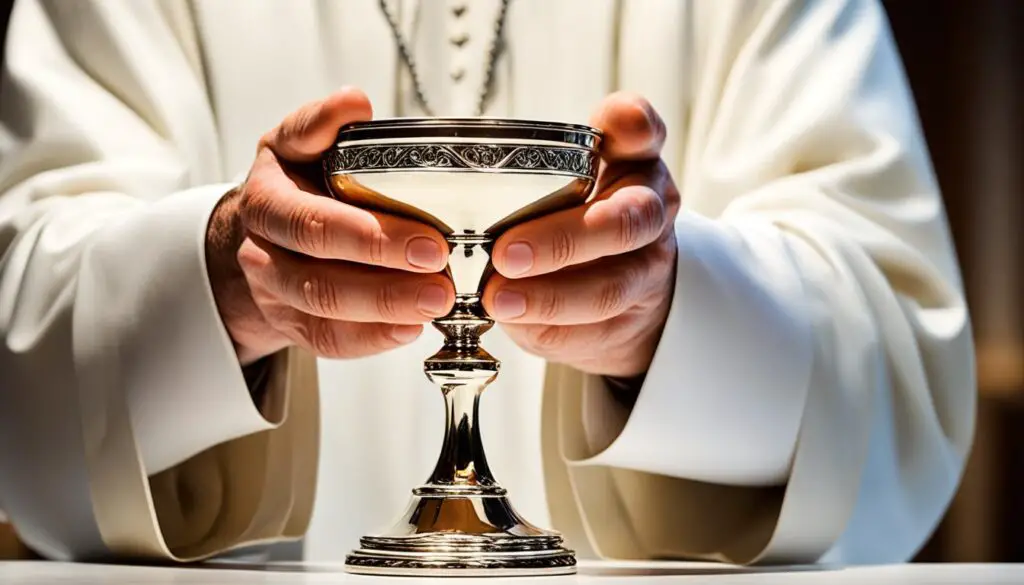
| Requirements | Description |
|---|---|
| State of Grace | Believers must have received the sacrament of confession and sought forgiveness for serious sins. |
| Belief in Transubstantiation | Acceptance of the doctrine that the bread and wine become the actual body and blood of Jesus Christ during communion. |
| Fasting before Communion | Abstaining from food, drink (except water) for at least one hour before is a sign of respect and preparation. |
| Good Standing with the Catholic Church | Being baptized, confirmed, and actively involved in Catholic Church life is essential. |
Communion Requirements in the Orthodox Church
The sacrament of communion in the Orthodox Church is very important. It is treated with respect and requires preparation. Orthodox Christians must fast and confess before taking part, to ensure a good experience.
Believers get ready for the Eucharist by fasting. They give up food and drink for a time before the Divine Liturgy. Fasting helps purify their bodies and minds for spiritual connection during communion service.
Confession is also key before communion. It helps people ask for forgiveness, get right with God and the church. Confession makes their hearts ready and humble to receive the holy sacrament, renewing their faith.
When Orthodox believers go to take communion, they cross themselves. They show respect for the body and blood of Christ this way. They also hold a cloth under their chin to catch any blessings that may fall.
They are very careful not to drop any part of the communion elements. If something does fall, the priest will consume it with utmost respect. This ensures that nothing holy is wasted or treated without reverence.
Summary:
In the Orthodox Church, before taking communion, members fast, confess, and follow rules for receiving the Eucharist. These steps help believers prepare inside and show deep respect for the holy elements.
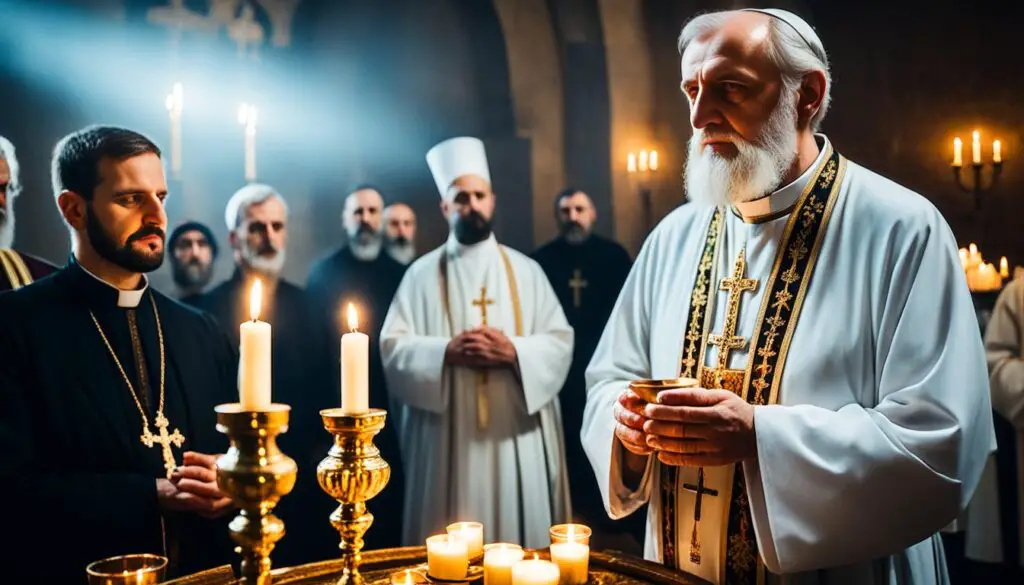
| Orthodox Church Communion Requirements | |
|---|---|
| Fasting | Believers fast before Eucharist to spiritually prepare. |
| Confession | They confess to seek forgiveness and strengthen their faith. |
| Specific Guidelines | They cross themselves and use a cloth to show respect. Dropping elements is to be avoided. |
Communion Practices in Protestant Churches
Protestant churches do communion in different ways. Yet, they share the important meaning of communion. This makes the celebration rich and open to many.
Some churches use wine and one cup together. This shows the togetherness of believers. Others pick grape juice and small cups for health and choice. This shows how churches consider different needs.
In many Protestant churches, there is something called “open communion.” This means anyone can join in, no matter their church background. It shows that faith connects us all and promotes friendship among Christians.
Open communion brings people of all backgrounds together. They worship and enjoy the blessings of communion as one. It helps them focus on what they share and respect what makes them different.
Protestant churches want to foster love and understanding through open communion. They show that sharing communion goes beyond church labels. It is a time to unite in worship as Christ’s followers.
Together, the ways that Protestant churches do communion show its beauty and meaning. Whether by choice of drink or in welcoming others, churches express their faith. This brings people closer in spirit and togetherness.
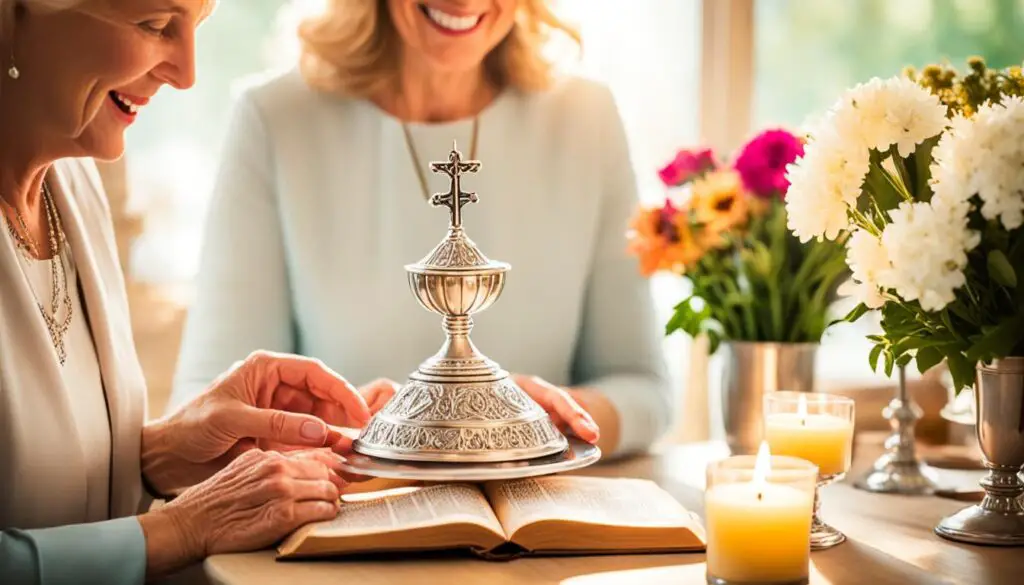
The Significance of Communion in Worship Services
Communion is very important in worship services and has a special meaning for those who believe. It is a time to think, show thanks, and make a strong connection with God. This action is a central part of worship and a spiritual tradition in churches.
Being part of communion at church is more than a symbol. It is how believers keep their faith alive and show their love for God. When they take the bread and wine, they remember Jesus’ sacrifice.
The Spiritual Practice of Communion
Communion is more than a routine; it helps believers think about their connection with God and what their faith means. The bread and wine make them meditate on God’s love and the grace he gives.
Also, communion helps them think about their own actions and seek forgiveness for their mistakes. It is a time for self-checking, saying sorry, and starting fresh. This way, they can get closer to God and follow his path better.
By taking part in communion, worshippers feel like they belong to the same faith group. It reminds them that they are all united in their beliefs and in following Jesus’ teachings of love.
Communion isn’t just a tradition; it lets believers connect with God in a special way. It is a chance to be thankful, recall Christ’s sacrifice, and join in worshipping. It makes us feel closer to God and to each other as we do this spiritual act together.
During a worship service, communion makes a place where believers can meet God closely. It is a time for peace and personal thinking, where they can thank God, pray, and ask for help. With this personal moment, worshippers can feel their faith and hope grow.
Communion also includes prayers, songs, and readings from holy writings. These parts make the whole service more powerful and life-changing. The time spent in worship with communion as focus is very special to believers.
Taking part in communion is a deep way for believers to show their love and faith in God. It joins the personal act of communion with the group act of worship. This combination makes the worship service rich and full of change.
The Symbolic Nature of Communion
Communion is a symbolic meal within the Christian tradition. It symbolizes the body and blood of Jesus. It reminds us of God’s unconditional love and the sacrifice for our redemption.
The bread and wine symbols in communion are deeply meaningful. The bread shows Jesus’ broken body and the wine his shed blood. Through communion, followers remember and honor Jesus’ sacrifice. They see its big impact on their lives.
| Symbol | Meaning |
|---|---|
| Bread | Represents Jesus’ broken body on the cross |
| Wine | Symbolizes Jesus’ shed blood |
Communion helps believers feel closer to Jesus and understand his sacrifice better. It reminds us of God’s deep love. Believers can think about their faith and promise to follow Jesus better.
Communion’s deep meaning goes beyond eating bread and drinking wine. It shows the spiritual food and life in Jesus. It also shows the union and friendship among believers. This tradition inspires and strengthens Christian groups worldwide.
The Role of Communion in Spiritual Growth
Communion is a key part of the Christian faith. It helps believers grow spiritually and personally. It allows them to feel God’s grace and get closer to Him.
When people take part in communion, they remember Jesus’s sacrifice. He gave His body and blood for everyone. This brings a deep sense of God’s love and makes people think about their actions.
Believers use this time to look at their own hearts. They ask for forgiveness and renew their faith. It’s a time to really think about how they can be better.
“Communion is a sacred time to reflect on our relationship with God and seek His guidance for personal growth.”
Communion also reminds believers they are part of a big Christian family. It shows that they all believe and value the same things. This makes them feel like they belong.
By taking part in communion, believers know they are not alone on their faith journey. They support each other as they grow spiritually. It’s a community that helps them become better people.
Communion lets people open up to God’s power for change. They let God lead them in becoming better. It’s a special way to walk the same path Jesus did.
The Transformative Power of Communion
For believers, communion brings strength and a fresh start. It offers hope, strengthens faith, and sparks desire for spiritual growth. People feel they need God’s grace and want to live a holy, righteous life.
Image:
Conclusion
Communion is a loved tradition in the Christian faith. It celebrates Jesus Christ’s love through his sacrifice. Believers grow spiritually and come together in the church. By taking part in communion, one can grow closer to God and show more respect and love.
Communion is more than a personal act. It helps believers grow spiritually together as a community. It reminds us of Jesus’ sacrifice with bread and wine. This reminds us to be thankful for God’s love and forgiveness.
Also, communion is important for the wider Christian community. It helps people show kindness, forgive others, and help those in need. It makes everyone feel united and strong together.
In conclusion, communion is a key part of the Christian faith. It helps believers spiritually and promotes unity. Through this, people understand the importance of love and mercy, making society better for everyone.







